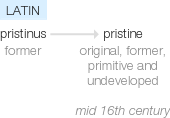Pristine
mid 16th century (in the sense ‘original, former, primitive and undeveloped’): from Latin pristinus ‘former’. The senses ‘unspoilt’ and ‘spotless’ date from the 1920s.
wiktionary
From Middle French pristin, borrowed from Latin pristinus.
From Ancient Greek πρίστης(prístēs, “a saw, one that saws”).
etymonline
pristine (adj.)
1530s, "pertaining to the earliest period, of a primitive style, ancient," from French pristin and directly from Latin pristinus "former, early, original," from Old Latin pri "before," from PIE root *per- (1) "forward," hence "in front of, before, first." Meaning "unspoiled, untouched, pure" is from 1899 (implied in a use of pristinely) is extended from such expressions as pristine wilderness, but according to OED [2nd ed. print], this is regarded as ignorant "by many educated speakers."
